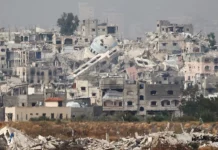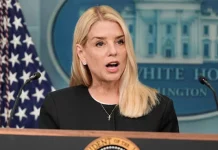-Zelenskiy decree rules out Ukraine talks with Putin as impossible
-EIB also signals plan for Ukraine fund
From Sandra Johnson
WASHINGTON: US President Joe Biden told Ukrainian President Volodymyr Zelenskiy on Tuesday that Washington will provide Kyiv with $625 million in new security assistance, including High Mobility Artillery Rocket System (HIMARS) launchers, the White House said.
Biden was joined in the call by Vice President Kamala Harris, the White House said in a statement. The president underscored that Washington will never recognize Russian annexation of Ukrainian territory, it added.
Biden “pledged to continue supporting Ukraine as it defends itself from Russian aggression for as long as it takes,” the statement said.
President Volodymyr Zelenskiy signed a decree on Tuesday formally declaring the prospect of any Ukrainian talks with Kremlin leader Vladimir Putin “impossible”, but leaving the door open to talks with Russia.
The decree formalised comments made by Zelenskiy on Friday after the Russian president proclaimed four occupied regions of Ukraine to be a part of Russia, in what Kyiv and the West said was an illegitimate farce.
“He (Putin) does not know what dignity and honesty are. Therefore, we are ready for a dialogue with Russia, but with another president of Russia,” Zelenskiy said on Friday.
Ukrainian forces have broken through Russian defences in the south of the country and expanded a rapid offensive in the east, seizing back territory in areas annexed by Russia, which invaded Ukraine in February.
Putin, who turns 70 this week, has dominated Russia’s political landscape for more than two decades and could run for office two more times under constitutional reforms he presided over, potentially remaining in power until 2036.
Separately, the head of the European Union’s powerful lending arm has urged leaders not to backslide on climate targets amid the energy crisis and signalled a joint action plan from the world’s top development banks at next month’s COP 27 summit and on Ukraine.
Werner Hoyer, president of the European Investment Bank (EIB), said the energy market turmoil caused by Russia’s invasion of Ukraine had undoubtedly been a setback for net zero emissions goals, but that the path forward remained unchanged.
“We are going to have ahead some very difficult times,” Hoyer said in an interview, highlighting that European and developing world countries alike were now having to deal with the energy crisis.
“We have the alternative on the table and that is an aggressive move towards renewables and an aggressive move towards energy efficiency, and we must not stop that now.”
Some of the most affected EU countries may take years to wean themselves off Russian oil and gas, but the need also to get through the coming winter would not see the EIB reverse its recent ban on fossil fuel lending.
“Some transition solutions will be necessary, but (for those countries) we are probably not the right address to turn to,” Hoyer said, referring to the fact that some governments would like its help funding alternative oil or gas infrastructure.
“Many of the things that might be a short term fix would be a big burden on balance sheets,” he added, warning those kinds of projects could end up effectively worthless “stranded assets”.
Hoyer acknowledged the 65-80 billion euros ($64-79 billion) the EIB invests each year “would never be enough” to address the issues.
It is, though, also currently chairing the 12-member Multilateral Development Bank (MDB) group including the likes of the World Bank, the International Monetary Fund and the main Asian and African development banks, which between them have trillions of dollars and euros of firepower.
The next focus of this group is the IMF and World Bank meetings in Washington in a week’s time, followed by November’s COP 27 climate summit in Egypt, where Hoyer expects a collective approach.
“I think on most issues we are already quite united and we will use the opportunities of meetings in Washington over the next weeks in order to come up with a common offer,” he said.
“I cannot go into details or figures, but it is crystal clear that we must radiate our conviction that climate action is now more necessary than ever.”






